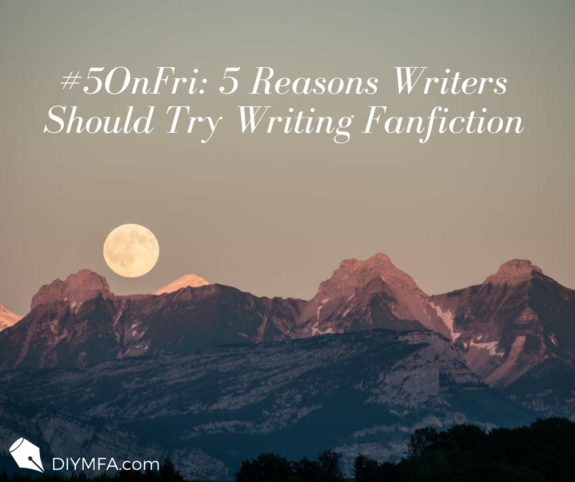Hey, you, writer. Do you have a ‘dirty little secret’? Is there an extra reason why you don’t let anyone read your old stuff? I bet you’ve written fanfiction. I’m here to tell you not to be ashamed of your archives. Fanfiction can be a serious tool for writers looking to learn, grow, and find support.
Fanfiction is increasingly recognized as a legitimate form of expression, and dismissing it means ignoring some mighty names who have written it. And let’s not forget, fanfiction isn’t that different from, say, being commissioned to write a Star Wars novel.
I started out in the fanfiction trenches in middle school, and I wrote some 260,000 words before I quit. It was excellent practice, and helped fuel my desire to keep writing. Here are five things I learned along the way.
1) The communities can be supportive and encouraging
I’ve never felt more love for my writing than when I was engrossed in fan communities. Each time I posted a new item I would get a flood of comments telling me they loved it, they wanted more. (Always more!) There was no serious critique, which was just what I needed at the time: unflagging encouragement. When you’re new to the game, that’s a great feeling.
Fandom is about the shared love of someone’s work. People come together to celebrate, to indulge, to have fun. Like any community, there can be negative interactions, but fandom itself outlasts the trolls. Find your tribe and ride the wave of positive, mutually-beneficial love.
2) You can focus on craft by putting some elements on hold
You know the complaints people have with fanfiction. You’re using someone else’s world. But for writers, starting with a world and characters that come pre-built can be a boon. A lot of developmental work is taken care of by the original creators, and you, the fic writer, get to play in the pre-built sandbox. That means you can focus on other elements of craft, like plot, theme, scene building, and evoking emotion in your reader.
You wouldn’t try to build a computer or a car from scratch without tinkering with some existing models first. Get to know how each part does its job, then invent your own.
3) You can experiment freely with no editorial requirements.
There is no editor making demands. No deadline you have to hit. You get to work to your own schedule, and are only answerable to your beta readers and the wider readership. That gives you a ton of freedom!
First off, you can learn what ‘your own pace’ means. Do you need a week or a month to ruminate on the next chapter, or can you write several in a few days?
Set your own deadlines, either privately, or as a promise to your readers. Do deadlines make you nervous, or do they spur you to greater heights?
And let go of worrying about what anyone else thinks. This is a free zone for you to experiment in. Switch POVs. Change tense. Throw in some slapstick, or a wild action scene. You’re not under contract and you didn’t make any unbreakable promises up front about what you would deliver. This is your sandbox to play in.
4) You’ll study your source material in depth—yes, literary criticism of your favorite genre novel or show!
If you want to do this fanfiction thing right, you’re not just using someone else’s work. There’s an expectation that you will, in some manner, be true to the original work. That means the characters need to stay in-character. That means you can’t break the rules of the world. You need to know the source material inside and out. That takes time and dedication.
The Hugo Awards include several fan categories, including fan writer, fan artist, fancast and fanzine, as well as Best Related Work. That’s where you can find in-depth analysis, like 2017 nominee The Women of Harry Potter by Sarah Gailey. Gailey has written profiles of six female characters, picking apart their motivations and highlighting their resilience.
For a fanfiction writer who wants to play it straight, depict the characters as true to cannon as possible, this is gold. And for all other writers, it’s platinum. If you struggled with literary criticism in school, studying books you were forced to read, try studying a book that you read for pleasure. Figure out what the writer did that makes you love it so, so much.
5) You can play out your dreams
I have this theory that fanfiction is driven by the desire to fill in holes, to achieve what the original doesn’t provide. (I come from the Gundam Wing fandom, where the show has no romance. Guess what ALL the fanfiction is about?)
Do those two characters who make eyes at each other never manage to get together? Write it yourself. Are you sick of waiting for winter to come? For dragons? Write about it. Is the cannon sorely lacking in people who look like you and the rest of the real world? Rework it. Ending leave you hanging? Reimagine it.
Fanfiction is all about possibilities. Fandom is a rich place full of people who love what they’re doing. You shouldn’t feel ashamed to be part of that. You, writer, are exploring all avenues to becoming a better writer. So go play.
 Bronwen Fleetwood writes contemporary and fantasy novels for young adults. After four years running the Princeton Writing Group and acting as Municipal Liaison for the Central New Jersey Region for NaNoWriMo, she’s gone back to her roots in South Africa. From her home between the mountains and the sea she connects with writers globally through the Twitter chat #RPmyBook. Visit Bronwen at her website, or on Twitter.
Bronwen Fleetwood writes contemporary and fantasy novels for young adults. After four years running the Princeton Writing Group and acting as Municipal Liaison for the Central New Jersey Region for NaNoWriMo, she’s gone back to her roots in South Africa. From her home between the mountains and the sea she connects with writers globally through the Twitter chat #RPmyBook. Visit Bronwen at her website, or on Twitter.







